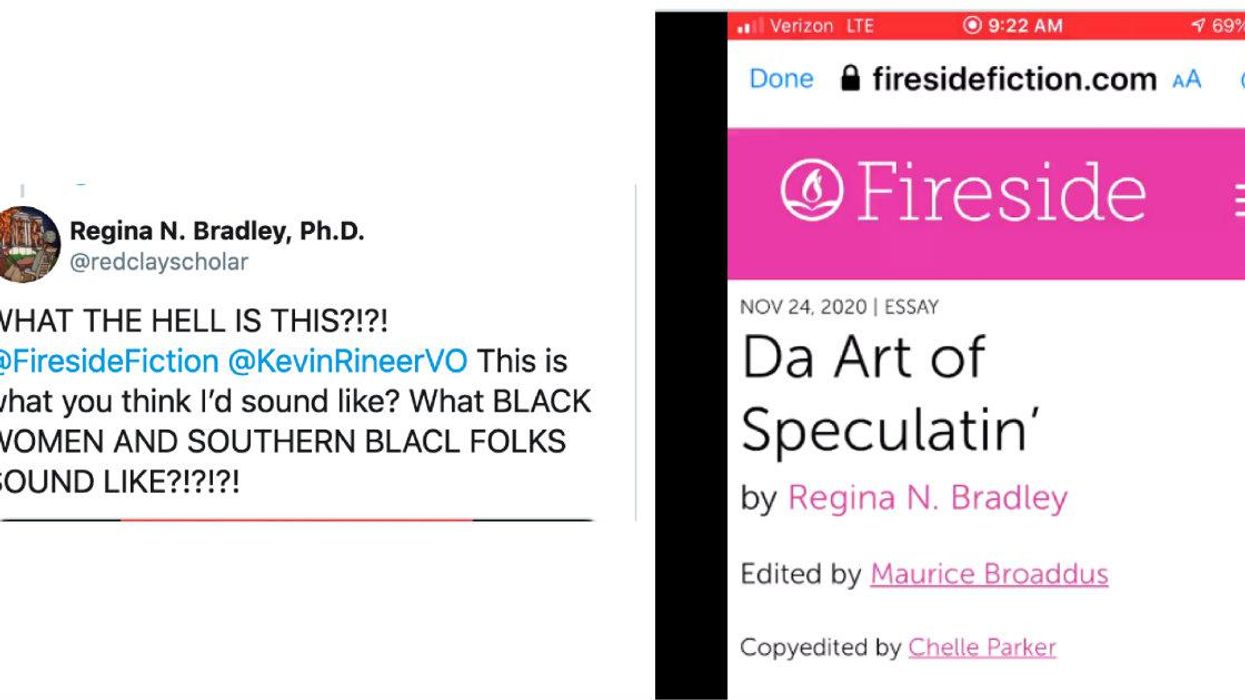
Blackface has a long and shameful history in this country. We think—we hope—after numerous call-outs and emotional explanations, Americans get the message: blackface is not okay. But that isn’t the case, as many were re-made painfully aware, when Dr. Regina N. Bradley, a professor and critically acclaimed writer, shared the shocking auditory version of her new essay, “Da Art of Speculatin'”, on Twitter.
Due to outrageous oversight, Fireside—a progressively minded short-story magazine who claim, in their About page, to resist “the global rise of fascism and far-right populism”—hired a young, white male voice actor to read and record Bradley’s essay—an essay that identifies its writer, in its very first line, as a “southern Black woman who stands in the long shadow of the Civil Rights Movement.”
According to the Washington Post, Rineer spoke in an accent that listeners interpreted as something that would appear in minstrel show, an American form of entertainment developed in the early 19th century, in which white people lampooned Black people, often portraying them as dim-witted and buffoonish, with stock characters including the dandy, the slave, and the ‘mammy.’ It’s incredibly, incredibly offensive. So it’s no wonder that, upon hearing the clip, a horrified Bradley fired off an outraged tweet, asking Fireside and Rineer if they honestly thought this is what she sounded like.
WHAT THE HELL IS THIS?!?! @FiresideFiction @KevinRineerVO This is what you think I’d sound like? What BLACK WOMEN A… https://t.co/h5WeYmFgyW— Regina N. Bradley, Ph.D. (@Regina N. Bradley, Ph.D.)1606227938.0
How could something so offensive have been approved, one wonders, especially in a year defined by reckoning with racial injustice? For the answer, look to Pablo Defendini, the publisher and editor for Fireside, who claimed, “nothing insidious in his decision… he just didn’t listen to the recording before posting it.”
“The blame for this rests squarely with me, as the person who hires out and manages the audio production process at Fireside,” Defendini said in a statement. “In the interest of remaining a lean operation, I’ve been hiring one narrator to record the audio for a whole issue’s worth of Fireside Quarterly, and I don’t normally break out specific stories or essays for narrating by particular individuals.”
“My personal neglect allowed racist violence to be perpetrated on a Black author, which makes me not just complicit in anti-Black racism, but racist as well.”
As for Rineer, he regrets not breaking a contract rule and contacting Bradley directly about her work. His gut instinct told him not to proceed—that he was the wrong person for the job. Still, upon expressing his doubts to Fireside, he was ignored, and so proceeded with the recording—he’d already signed the contract.
“I made the mistake of reading Dr. Bradley’s work and assuming an accent that was not representative of her voice,” he said. “I had tried to find a different narrator who would be a suitable representative in my network and via public forums, to no avail, in the week-long time frame I had.”
As for Bradley, Defendini’s apology isn’t cutting it. “Not listening” isn’t an excuse—it’s deepening the wound. Black Women have been “not listened” to since the dawn of this nation’s founding.
“I am angry,” she wrote. “Seething from centuries of silenced Black women angry.”
